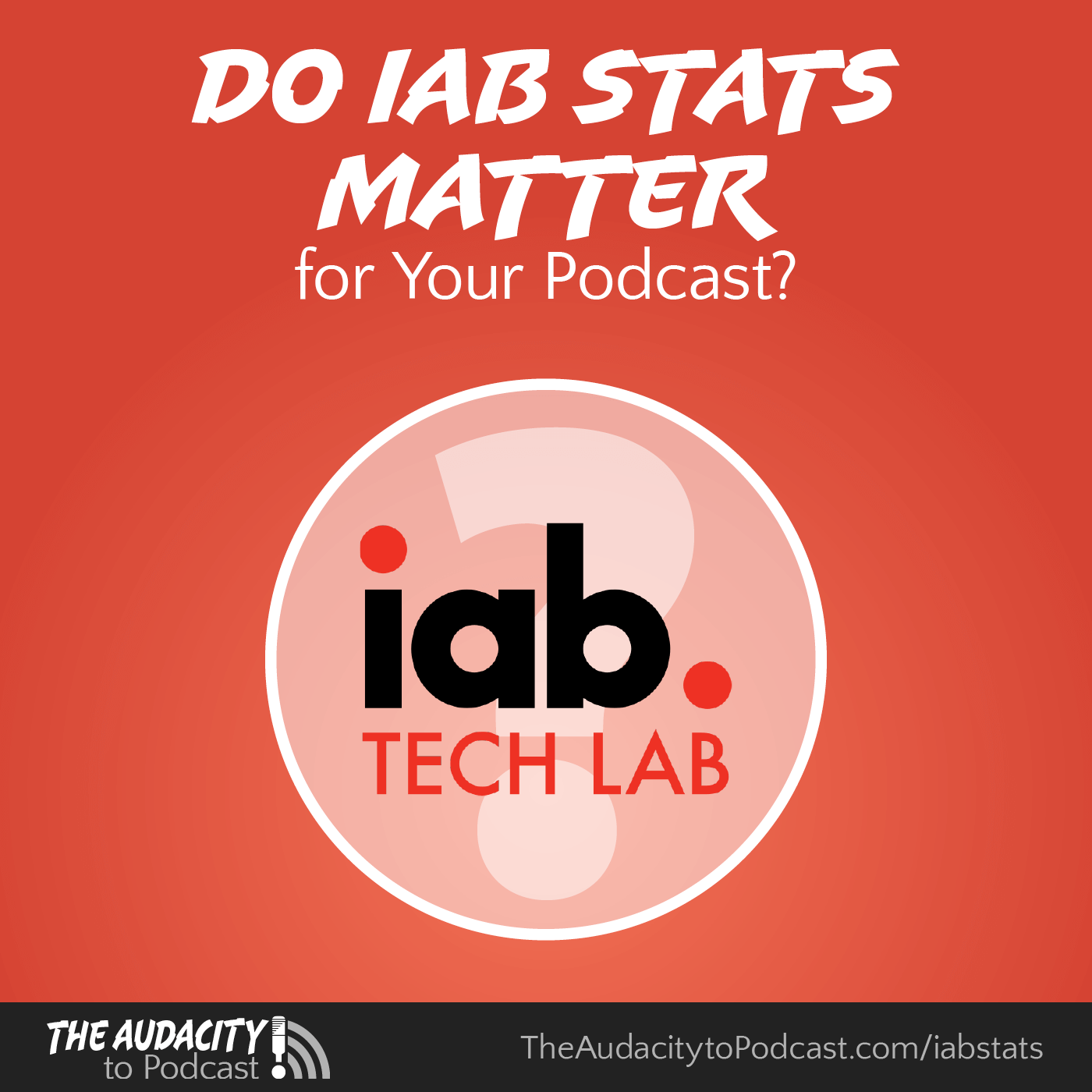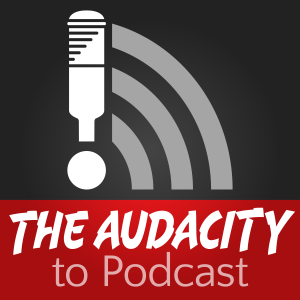
Do IAB-Certified Stats Matter for Your Podcast?
 2024-03-13
2024-03-13
You might have heard people talk about IAB podcast stats, measurement guidelines, compliance, and certification. Here's what all of that means, and whether it even matters!
Who is the IAB?Once upon a time, podcast measurement was considered the “wild, wild west”: without standards. Everyone measured what was right in their own eyes.
But like most things that start with “Once upon a time,” that was only fairy tale. And yet a fairy tale that many corporate podcasting companies believed.
Many years ago, there was the Association of Downloadable Media (ADM) that included Blubrry, Libsyn, Podtrac, and other podcasting companies. The ADM came up with standards for measuring podcast downloads still in the extremely early days of podcasting.
The ADM eventually dissolved and top podcasting companies improved on the measurement standards within their own proprietary systems. Then along came the Internet Advertising Bureau (IAB), involving many of those same original podcast-hosting providers but also large distribution networks like PodcastOne and more.
As its name implies, the IAB is all about internet advertising. And the podcasting industry needed a standard way to measure podcast ad impressions. And thus, the IAB podcast measurement guidelines were born with version 1.0 in September 2016!
What are IAB statsIAB's podcast measurement guidelines are actually not rigid standards, but mere guidelines for podcast-analytics providers to use.
Like Elizabeth Swan said in Pirates of the Caribbean: Curse of the Black Pearl, “Hang the code and hang the rules! They're more like guidelines anyway!”
Without getting into the technical details, these guidelines are intended to filter out any kind of invalid podcast download in attempts to get an accurate count of how many people actually downloaded or streamed the episodes (and with the hopes, backed by survey data, that most of the people actually listen to most of those episodes).
(Sidenote: podcast “streams” are also downloads, simply not downloaded until the person presses play.)
These guidelines involve things like the following.
- Ignoring all downloads from an IP address blacklist (such as data centers, bot farms, and such)
- Ignoring all downloads from known invalid user agents (how a downloading app or service identifies itself)
- Ignoring duplicate downloads that look exactly the same within a period of time (usually 24 hours)
- Ignoring downloads that don't reach a threshold (one minute of audio)
- Whitelisting some IP addresses known to have a lot of users—like public wi-fi, businesses, colleges, and such—and allowing such downloads to be counted separately with the reasonable assumption that it is separate people
The top goal is to count people, not simply downloads. Because it's only people who buy things from ads, engage with the podcaster, and listen to or watch the episodes.
These IAB guidelines get updated every few years. As of March 2024, the latest version is 2.2 still in proposal stage for public comment.
IAB “compliance” versus “certification”When the IAB guidelines were first released, many in the podcasting industry—including myself—expressed the importance that all podcasting companies that provide audience analytics should not only follow the IAB guidelines, but even get certified to be following them.
But there were also many others who disagreed with the guidelines—some people thought the guidelines were too conservative, others thought they were too liberal.
Because the guidelines are publicly accessible, anyone can build a tool that follows the guidelines. And that's where the term “IAB–compliant” came in. It was companies simply claiming compliance based on how they implemented the guidelines.
Then along came the certification program. This was a costly process—in both time and money—for a third-party organization to conduct tests and review code to ensure the companies were truly following the guidelines, and then certifying them.
You can see the list of certified podcasting companies here.
Not only does it cost to be certified, it also costs to be a member of the IAB. And it also costs to be recertified, which the IAB was pushing in 2023. And it costs to have updated access to the IAB's whitelists and blacklists of IP addresses. But with the high cost of these things, it seems that several companies are not so concerned about being “certified” anymore. And you can see in the list of certified “podcast compliance” that several companies are still certified only to version 2.0.
Why IAB-certified podcast stats are goodI agree with the premise of the IAB podcast measurement guidelines: to have a consistent measurement “standard” across the podcast industry. The dream of this standard is that no matter who you use for podcast hosting and analytics, the statistics you get will be essentially the same. Put another way, 100 people downloading your latest episode would be counted as 100 downloads on Blubrry, or 100 downloads on Captivate, or 100 downloads on Buzzsprout, or 100 downloads on any other provider.
If everyone is following the same standard, then there wouldn't be the heartbreak and confusion if you switch from one provider to another and see a significant drop in your stats—because there shouldn't be much of a difference if everyone is measuring the same way!
So it's definitely a good thing for a podcasting company to follow the IAB guidelines, and being certified means that a neutral third party can confirm the guidelines are being followed correctly.
But every standard will have loopholesThat dream is, unfortunately, not the reality. The biggest reason is that, going back to Miss. Elizabeth Swan, the IAB podcast measurement guidelines are exactly and only that: guidelines!
As such, some companies will implement those guidelines differently. Or they use different whitelists and blacklists.
And over the years, there have been multiple loopholes found that some companies independently patch even though the IAB guidelines might not account for them, yet. For example, “Twitter bombing” was a problem several years ago. That's where someone would post a direct link to their podcast media file (like an MP3) on Twitter, and then repeatedly post that link all day, every day. Companies like Blubrry and Libsyn caught this behavior fairly quickly and were able to filter it out so those misled (or outright deceptive) podcasters wouldn't have fraudulent stats.
I even caught a podcaster guilty of such a “crime” when they were Twitter-bombing my own guest appearance on their podcast. When I politely tried to share the truth with them, they deleted my episode!
Or more recently, some podcast networks put ads in mobile games where the podcast audio would start playing automatically and enough of the audio would pre-download (or “buffer”) that it would actually get counted as a legitimate download, even for IAB-certified providers!
In my past research for testing the fastest podcast hosting, I also discovered that some hosting providers counted some or even all of my bot downloads. And I didn't even attempt to disguise my bot downloads as real people using podcast apps! (Please note that some or—let's hope—all of those previously guilty companies have probably improved their measurement algorithms since that test in 2019! But probably not Soundcloud.)
Why you don't actually need IAB-certified podcast statsDoes it really matter anymore if your podcast-hosting provider has IAB-certified stats?
I think it's nice to know your numbers are certified, especially if you get paid by advertisers based on your downloads.
But at this point, I think it's safe to assume all the good podcast-hosting providers are following the guidelines and seek to filter out all non-person downloads. They could probably better invest the money it would cost to be certified instead into building better features for their customer: you!
And here is what I think is the even more important approach: do IAB-certified stats matter to your audience?
The answer is most likely a big fat “HUH?” Because your audience probably doesn't know or doesn't care, and they shouldn't have to know or care, either!
Your audience can celebrate milestones with you no matter whether those milestones are certified by an expensive neutral third party. Your audience cares much more about the value you deliver through your podcast than they care about how many downloads you are getting.
In other words, the answer to the audience's “What's in it for me?” is probably “nothing.”
Yes, more downloads could mean more P.R.O.F.I.T. (popularity, relationships, opportunities, fun, income, or tangibles) for both you and your audience, and it can mean a bigger community for your audience to engage with each other. But that comes with the actual people in your audience, not the standard by which you measure them!
I've changed my mind about IAB certificationThus, because IAB certification really doesn't matter to your audience, I've stopped considering it a requirement for any podcast-hosting provider or analytics tool I recommend. It's nice to have, but not mandatory.
Instead, I'm far more interested in the innovations podcasting companies are making, so that the whole experience can be better for you and your audience. That's why I consider support for Podcasting 2.0 to be my litmus test for podcast-publishing tools, and no longer IAB certification.
New feature: The Community Corner- 2,033 sats from “aqualith,” saying, “10k CAN be a lot for someone who doesn't feed their Fountain wallet, or equivalent, with outside funds and not currently podcasting themselves, despite engaging with the app daily. That said, thank you for this episode and this list. I immediately shared it with someone who's setting up their first podcast. Go podcasting!”
- 7,777 sats from Steve Web on “How to Use Podcast Transcripts,” saying, “GREAT episode, Daniel. While I have been using transcripts for some time on my shows, I wasn’t really sure I was doing it correctly. This episode will help me to make some changes going forward. Thank you, and may God bless you richly!”
- 333 from Allen C. Paul also on “How to Use Podcast Transcripts,” saying, “Couldn’t help but notice this episode doesn’t have a transcript! lol! but great info.” Allen has also been giving my episodes 5 stars on Goodpods!
- “A.J.II” from the United States gave me a 5-star review in Apple Podcasts, saying, “Advice is stellar. His style and topics along with the way he speaks and communicates is terrific.Thanks!”
- And Dave Jackson responded to my “mythinformation” line with a voicemail saying, “Daniel absolutely myth information and that is hard to say definitely made me chuckle.” (That voicemail and transcript were powered by Podgagement!)
Do you ever feel like your podcast is stuck? Like you're pouring your heart into your podcast but it seems like no one is listening?
Try Podgagement to help you engage your audience and grow your podcast!
Get speakable pages to simplify engaging with your audience, accept voicemail feedback (with automatic transcripts), track your ratings and reviews from nearly 200 places, and more!
Ask your questions or share your feedback- Comment on the show notes
- Leave a voicemail at (903) 231-2221
- Email feedback@TheAudacitytoPodcast.com (audio files welcome)
- Apple Podcasts, Spotify, other Android apps, or in your favorite podcast app.
- Subscribe on YouTube for Podcasting Videos by The Audacity to Podcast
- Follow @theDanielJLewis on X-Twitter
This post may contain links to products or services with which I have an affiliate relationship. I may receive compensation from your actions through such links. However, I don't let that corrupt my perspective and I don't recommend only affiliates.
The post Do IAB-Certified Stats Matter for Your Podcast? first appeared on The Audacity to Podcast.
More Episodes
 2012-01-24
2012-01-24
 2012-01-16
2012-01-16
 2011-12-19
2011-12-19
 2011-12-06
2011-12-06
 2011-11-14
2011-11-14
 2011-11-07
2011-11-07
 2011-10-31
2011-10-31
Create your
podcast in
minutes
- Full-featured podcast site
- Unlimited storage and bandwidth
- Comprehensive podcast stats
- Distribute to Apple Podcasts, Spotify, and more
- Make money with your podcast
It is Free
- Privacy Policy
- Cookie Policy
- Terms of Use
- Consent Preferences
- Copyright © 2015-2024 Podbean.com





